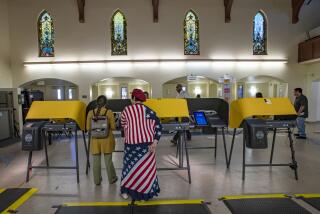PERSPECTIVE ON POLITICS : Polls, Pols: Disturbing Codependence : Nixon administration archives reveal the danger of pollsters and presidents sharing insider data.
- Share via
America’s leading pollsters, Louis Harris and the Gallup organization, have long had a policy of sharing information with presidents. One of President Clinton’s pollsters, Stan Greenberg, acknowledges that he regularly communicates with pollsters who work for the media.
Harris and George Gallup Jr. strenuously defend the practice of cooperating with any president who approaches them. They view cooperation as a public service for the country and as a necessary part of working in the news business. Pollsters also welcome questions for surveys from the White House because they provide an opportunity for timely polls on policy questions.
Treating White House contacts as only an innocent sharing of information, however, is dangerously naive. Polls are a weapon on the political battlefield; they provide both ammunition and strategy for one side or the other. Political operatives, capitalizing on inside information, can plan special events in advance to influence a poll’s results. The White House, of course, has unparalleled abilities to take advantage of back-channel contacts and advance information.
Our research into President Richard M. Nixon’s archives presents a rare glimpse into the White House’s use of Gallup’s and Harris’ cooperation. Confidential records from those years document a disturbing pattern in which Harris decided--at the suggestion of Nixon aides--to withhold from publication, bury within long columns and alter poll results unfavorable to the president. We document (and Harris confirmed in a recent interview with Associated Press) that he killed the lead to his syndicated column in response to pressure from Nixon aide Charles Colson. He also agreed to average the results from two separate polls and produce the illusion of a jump in Nixon’s popularity heading into the 1972 campaign.
When tipped off about poll results before they were published, Nixon pressed his army of aides to “merchandise” and “exploit” the polls by developing “game plans” to boost his political standing. On one occasion, according to H.R. “Bob” Haldeman’s diaries, Nixon ordered his chief of staff to “build up the next Gallup poll for a major ride, letters and calls ahead [and] a major column by [Pat] Buchanan about remarkable survival with press opposition.”
Administration events were planned with an eye toward influencing surveys as they were being conducted. Nixon also capitalized on his close contacts with Harris and Gallup to, as the president put it, plant loaded questions in order to get the best poll results.
Nixon’s efforts illustrate the danger in sharing information with the White House, even if such information is also distributed to others. The problem is that a president’s resources for capitalizing on pollsters’ tips cannot be matched. When Gallup or Harris used the Nixon administration’s questions, the White House was manipulating the pollsters to score political points and to set the terms of public discussion.
Pollsters today have become secular priests, divining the public’s will and thereby influencing the judgments of members of Congress, journalists and others. To safeguard the credibility of published surveys, media pollsters must distance themselves from politicians. Being a detached scorekeeper requires minimizing contact with the political figures being evaluated. The appearance or suspicion of contacts between the White House and pollsters can only tarnish the public’s faith in pollsters as impartial and objective.
Perhaps the most fundamental issue in reading polling results is whether we can trust the numbers that are published. Regular contacts with the White House open the way for political tampering with poll results.
Political pollsters occupy a precarious position. They evaluate presidents who wield powerful resources to influence their work. And yet, their credibility with the public requires detachment and objectivity in deciding the wording of questions and the reporting of results. The only approach to ensuring the pollsters’ reputation as trusted scorekeepers is to keep the White House and other politicians at a distance.
More to Read
Get the L.A. Times Politics newsletter
Deeply reported insights into legislation, politics and policy from Sacramento, Washington and beyond. In your inbox twice per week.
You may occasionally receive promotional content from the Los Angeles Times.










